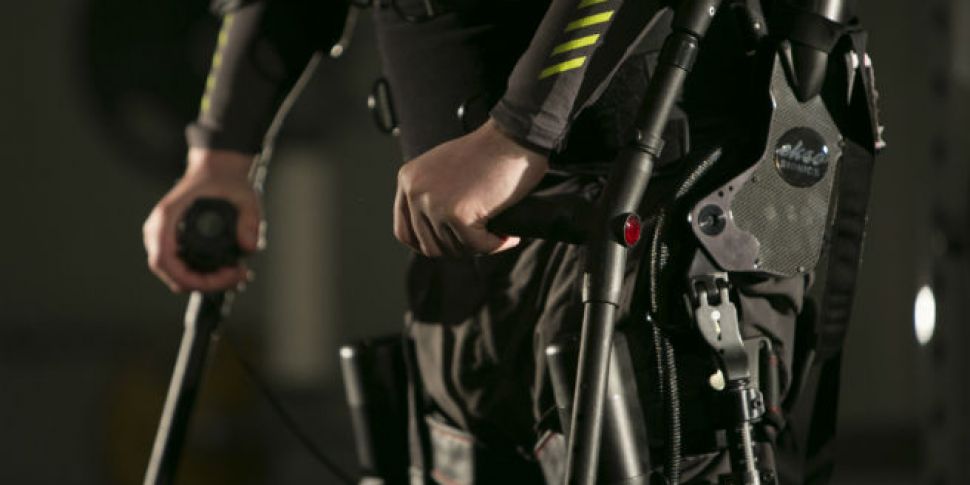Newstalk Magazine is available now for free from the Apple app store.
Mark Pollock is an adventurer, athlete, rower, kayaker, author and international motivational speaker from Northern Ireland. He is also blind, and paralysed. He has made the decision that he will walk again, and pave the way for others to follow in his footsteps. “When I was young I wanted to compete. When I went blind, I wanted to go further. When I broke my back I just wanted to walk again. And I will.”
It’s nearly a year and a half since he took his first few faltering steps in a revolutionary new set of robotic legs. What a journey it’s been. In July 2010, when news came through that Mark had fallen from a second story window and become paralysed, people all over the country wondered how he would respond to this tragedy.
Before the accident, Mark had become a symbol for overcoming adversity. Once a promising student and athlete, he woke one day to the realisation that he had lost his sight.
I heard him speak about his experiences years later. He talked about the depression that followed, the blackness of everything, as he lay in his flat, no longer able to see the world. He decided to keep rowing, to start exploring the world, pushing himself to the limits, later becoming the first blind man to conquer the South Pole. When he
could have wallowed in self pity, he picked himself up, and made the days count.
But what would happen now that he had damaged his spinal cord, when he could no longer physically pick himself up again?
He was being cared for in the Stoke Mandeville Hospital, home to the first spinal unit in the world. As Pollock grappled with the prognosis that he might not recover, he was told that hoping for a recovery would be psychologically damaging. He was told he should learn to use a wheelchair. Accept the reality.

For Pollock the subsequent months in hospital were almost unbearable. He walked through snow at the North and the South Poles, robbed of his sense of sight. He ran through sandstorms in the Gobi desert. But navigating his way through the abyss between hope and acceptance of his injury would be one of the greatest psychological challenges he would ever face. He finally made the decision that he would not accept his fate and would instead, innovate.
The unit he was in was founded by Doctor Ludwig Guttman in the 1940s. Back then, just 60 years ago, people in Pollock's position had a 20% chance of living for more than a year. Those who did survive would be institutionalised, forced to live outside of normal society. Guttman didn’t accept this. He challenged the status quo and made spinal cord injury a manageable prognosis with near normal life expectancy.
There was a lesson in this. What if he could follow Guttman’s style of thinking – what if, with the help of technological advances, and his own skills of physical endurance, he could be the one to challenge the inevitability of spinal cord injury, what if he could defy medical science, and walk again?
Pollock appreciates that without the medial assistance he received he would not have survived at all. “Without it I would be dead. Without it I wouldn’t be back at work, back living a life. Without my wheelchair, I couldn’t get around. This work is nothing short of a miracle. The formal medical structure has made possible the miracle of surviving spinal cord injury and re-integrating into society.”
However, he maintains that perhaps the strengths of the formal medical structure are also its failings, in that we need to have the innovation and the confidence to test the boundaries, rather than continually subscribing to received medical wisdom. What if there is a cure?

Thus, you will find Mark Pollock in grueling training for hours every day with his trainer Simon O'Donnell, using his own body for research to test out alternative therapies and products outside of the traditional acute rehabilitation system. “I am following an aggressive physical therapy programme, cycling on a functional stimulation bike
and walking in an Ekso Bionics robotic suit.”
A machine captures data each time he uses his legs. That information gets sent back to the Ekso Bionics laboratory in San Francisco and a physiotherapist meets up with Pollock every month to carry out tests.
“All of this is designed to improve the system and understand the impact that walking has on the body and mind of a paralysed person. From a personal perspective I’ve noticed two big positives with Ekso. I just feel better every time I walk and that psychological lift is positive in itself. Physically there is a clear impact. After each session
the small spasms that I get in my legs disappear and the dull pain in my back lifts.”
Mark is also mindful to thank all the people who have made it possible for him to get the robotic legs by showing up in their thousands to take part in the Run in the Dark events, raising vital funds. Led by Piers White, they are now building a series of runs around the world, spanning six continents, so that people all over the world can help to advance a cure for spinal injury.
Ever the pioneer, Pollock is now faced with yet another frontier: the road to recovery from spinal injury. “Sometimes the challenge chooses you. It’s what you do about it that counts.” This is the motto of the Mark Pollock Trust. It is fair to say that whatever he has been faced with Mark Pollock has made it count. When he was blind, he
helped people to see their potential; now that he’s paralysed, he wants us to follow in his footsteps.
WATCH: Video of Mark’s recovery
Mark Pollock Trust from Mark Pollock Trust on Vimeo.
*The Run in the Dark events are at 7:30 pm local time over 24 hours on 13th November 2013. There will be official events in Dublin, Cork, Belfast, London and Manchester with local champions organising pop up events in cities including Sydney, Hong Kong, Singapore, Bangkok, Dubai, Brussels, Paris, New York, Boston, Dallas, Toronto, San Diego and San Francisco. Go to the Run in the Dark website to find out how you or your business can get involved.
This article first appeared in the July edition of Newstalk Magazine and has been edited from its original format. Go here for more articles, features and photo essays.









